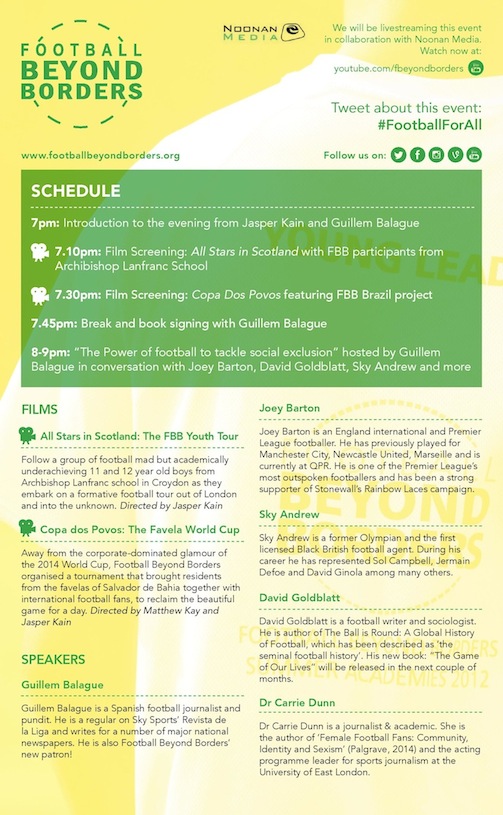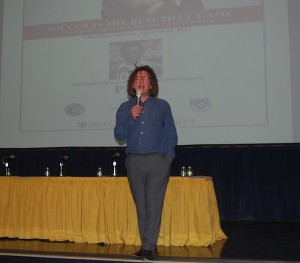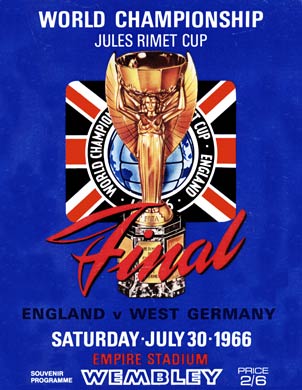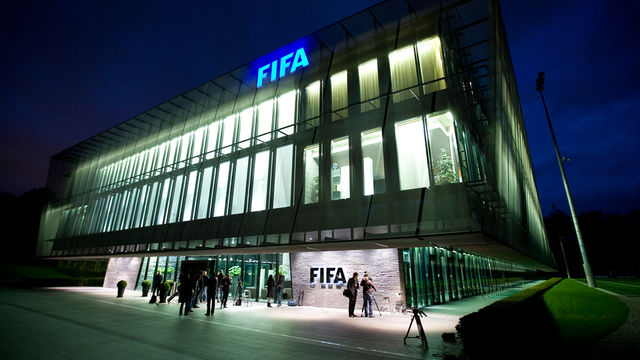
Guest Post by Dr. Matthew L. McDowell
The new home of the National Football Museum, the Urbis Building in Manchester, was the site of an international conference on September 2-4, 2013, celebrating the 150th anniversary of England’s Football Association. The event welcomed a group of around sixty speakers and an even larger group of delegates from different disciplines interested in the past, present, and future of football: its culture, its finances, its development, and its governance.
The varied affiliations of the participants made for some rather productive tension: critics of world football’s leaders and patrons rubbed shoulders with officials from the FA and UEFA, and no words were minced. Sir Trevor Brooking’s appearance at the outset of the conference, and Karen Espelund’s keynote address on the final day, were sandwiched around acclaimed author David Goldblatt’s second-day keynote: a brilliant, scathing, and often surreal account of FIFA in relation to the Brazilian riots of this past summer, which occurred while the Confederations Cup was staged in the country. (Those who were at the address will never think of AC/DC’s “Hell’s Bells” in the same way again.) All in all, it made for a highly enjoyable three days, and the National Football Museum (especially Dr. Jane Clayton and Dr. Alex Jackson) and the University of Central Lancashire’s International Football Institute pulled out all of the stops to ensure that all of us working within the broad continuum of “football studies” felt at home.
After Brooking’s interview with UCLan’s John Hughson – one of the driving forces behind the gathering – Tony Mason of De Montfort University, a renowned expert on English football’s history, introduced us to previous commemorations of the FA’s anniversary: some lavish, some passing barely noticed. I attended various sessions afterwards. Naturally, I leaned toward history: Tony Collins, Roy Hay, and Gavin Kitching formed an excellent panel advocating more research into what Collins called the “primordial soup” of football in the pre-Association era. The term “football,” as both Hay and Kitching stated, was representative of a very broad church prior to 1850, and was not confined to the “public school” sphere. Afterwards, I attended a session on the history of ‘soccer’ in the United States, with my native New Jersey finding its way into both Brian Bunk’s and David Kilpatrick’s papers: Bunk discussed the football-playing circle of the mid-nineteenth century Princeton University, while Kilpatrick discussed the colorful, controversial and recently-revived New York Cosmos, whose 1970s’ home was the NFL’s Giants Stadium. The “Nostalgia and Design” panel, which featured Jean Williams, Graham Deakin, Ffion Thomas and Chris Stride teased out the meanings in some of football’s most iconic (and, in the case of Shoot and Goal magazines, not-so-iconic) images through various media.
The second and third days featured their fair share of highlights. Notable among them was Gary James, who gave us a glimpse into late-nineteenth/early-twentieth century football in Manchester, a subject long neglected by academic historians. Matthew Klugman, Svenja Mintert, and Jessica Richards, meanwhile, discussed their own pioneering research, and their attempts to examine the emotions, desires and suspicions of “the fans” in a wide variety of time periods, places, and guises. (Richards, whose ethnographic research examines the match-day rituals and gender performance of Everton supporters, candidly discussed the risks associated with field work.) Meanwhile, “The Role of the Individual,” which featured Clayton, Jackson, and Dilwyn Porter, critically examined the mythology of some of football’s greatest characters, in relation to the archival material which actually exists regarding them. Referees, it seems, took great pains to present themselves in a heroic light against agents of chaos: Porter’s examination of 1930s referee Percy Harper stated that that Harper featured death threats from supporters in his own personal archive, perhaps as kinds of trophies. The ‘World Cup’ panel featured its own fair share of surprises. Though Peter Alegi could not make it to discuss his history of South Africa 2010 (the perils of transatlantic travel!), Marion Stell and Daniel Malanski examined FIFA’s global showcase in relation to Australian and Brazilian football history respectively, showing us that domestic politics inevitably colors how individual nations view participation in the tournament.
One wonders what Football 200 will look like. Will the ‘beautiful game’ continue to stress the paradoxes of being the world’s most popular sport, while at the same time being a focal point for fierce tribalism? Will we be bemoaning the “good old days” of the 2010s, a day before money, political correctness, and middle-class sanitisation took their toll on the viewing experience of the people? The thread of nostalgia has always run through popular perceptions of what the game should be; and, as Football 150 and its constituent presentations have shown, there is no one unified consensus on what the game has represented, or what it continues to demonstrate regarding our world. It is as confused as we are; and perhaps that, above all, is the appropriate message of the conference.
**
Dr. Matthew L. McDowell is a lecturer in sport and recreation management at the University of Edinburgh, Moray House School of Education. He was written on the early history of Scottish association football, and is currently researching Scotland’s history with the Empire and Commonwealth Games competitions, and early North Atlantic footballing cultural encounters. Follow him on Twitter: @MattLMcDowell
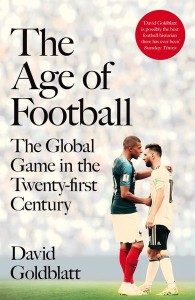 With Euros 2020 postponed until 2021 due to the COVID-19 pandemic, the Football Scholars Forum organized a five-part summer series with academic, journalist, and broadcaster David Goldblatt on his new book, The Age of Football: The Global Game in the Twenty-first Century [UK edition here / US edition here].
With Euros 2020 postponed until 2021 due to the COVID-19 pandemic, the Football Scholars Forum organized a five-part summer series with academic, journalist, and broadcaster David Goldblatt on his new book, The Age of Football: The Global Game in the Twenty-first Century [UK edition here / US edition here].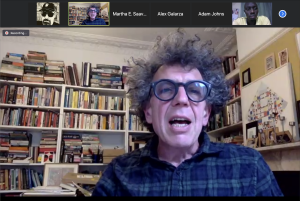 “It’s the hardest book I’ve ever written,” Goldblatt revealed. “A combination of Brexit and COVID kind of ate its public reception alive. That was quite hard to process,” he said. “This [series] has been a fabulous corrective to that. It means a lot to have you read it, to know that it held your attention, entertained you and maybe enlightened you along the way.”
“It’s the hardest book I’ve ever written,” Goldblatt revealed. “A combination of Brexit and COVID kind of ate its public reception alive. That was quite hard to process,” he said. “This [series] has been a fabulous corrective to that. It means a lot to have you read it, to know that it held your attention, entertained you and maybe enlightened you along the way.”